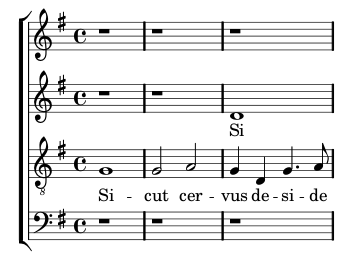
As we rehearsed it, I found that it grew on me. By the time we performed it, I had come to like it much, and the realization that I wouldn't be singing it again left me with some sense of loss.
Later, I discovered that Sicut Cervus is a work of some note; a Google search easily turns up characterizations such as
One of the great musical masterpieces of the Church...
... by many accounts the most outstanding example of religious choral art from the Renaissance.
One of the more gorgeous examples of polyphony...

The piece is in four, but it's kind of in two, and that first lone whole note might as well be in one. It is sung at a slow tempo, and I consistently had difficulty acquiring the meter through the first two bars.
In the third measure, you can see the altos enter at D over the tenors' G to make a 5th; the tenors alternate their G with D below, which makes a whole octave against the altos. Open harmonies like these continue throughout the piece, and lend it a flowing, haunting beauty.
Sicut cervus desiderat ad fontes aquarum,Here is a loose word-for-word translation from Latin to English
ita desiderat anima mea ad te Deus.
| Sicut | As | |
| cervus | the deer | |
| desiderat | longs | |
| ad | for | |
| fontes | springs | |
| aquarum, | (of) water, | |
| ita | so | |
| desiderat | longs | |
| anima | soul | |
| mea | my | |
| ad | for | |
| te | you | |
| Deus. | God. |
I'm not a dualist, so the English soul doesn't have much force for me. When I sing the Latin anima, I hear other English words that are descended from it:
The phrase reminds me a bit of the daemons in Philip Pullman's trilogy His Dark Materials.